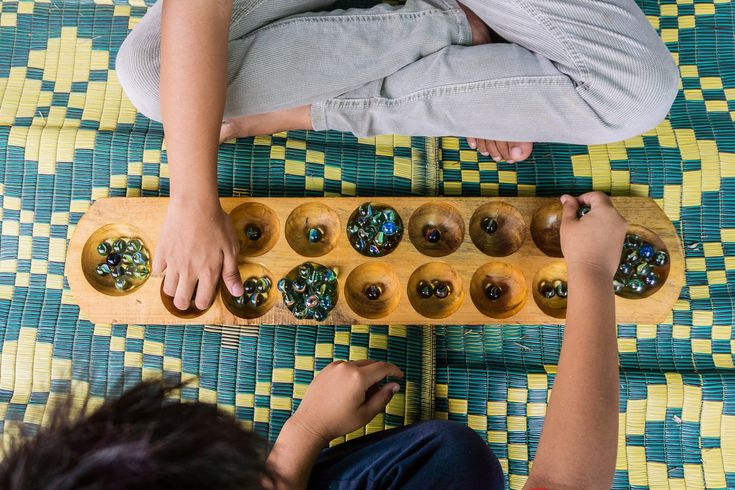Mangala is a strategy and intelligence game with historical roots in Central Asia, holding an important place particularly in Turkish culture. This game, played between two players, aims to outmaneuver the opponent by moving stones within specific rules. Mangala, included in UNESCO's Intangible Cultural Heritage List, is played not only in its traditional form but also in digital environments today.
Mangala is an intelligence and strategy game played in Central Asia and Anatolia, dating back thousands of years. As an important part of Turkish game culture, Mangala is considered one of the games from which chess originated, and it encourages strategic thinking and quick decision-making. This game, also known during the Ottoman period, has been played throughout history with different rules and names in various regions.
 Mangala Oyunu (Kimberly Yii)
Mangala Oyunu (Kimberly Yii)
Origin and History of Mangala
The oldest examples of Mangala have been found carved on rocks in the Dastarbası Cave in Kazakhstan. This finding indicates that the game has a history of at least 4000 years.
Etymology: Derived from the Arabic word mankala, meaning "to carry, to transfer".
Place in Turkish Culture: It is also known among Turks by names such as "Köçürme" and "Kuyu Oyunu".
Ottoman Period: It is known to have been widely played in the Ottoman palace and among the public.
How to Play Mangala
Mangala is usually played by two people. The game board is arranged with six small pits in front of each player and one large treasure (winning zone). The objective of the game is to strategically move the stones to empty the opponent's pits and collect the most stones.
Game Rules
- Players take turns distributing stones into the pits.
- If a player's stone lands in their own pit before running out, they earn the right to play another turn.
- It is possible to win by leaving a single stone in the opponent's pit.
- The player who collects the most stones at the end of the game wins.
These rules may vary regionally, and there are different versions in Turkey, Central Asia, and the Arab world.
Mangala Nasıl Oynanır? (How to Play Mangala?) (Samet Karaağaç)
Cultural and Educational Importance of Mangala
Contributions to Intelligence and Strategy Development
Mangala helps players develop their planning, concentration, and logical thinking skills. It is known that some statesmen during the Ottoman period played this game to practice strategic thinking.
Usage in Education
In Turkey and many countries, Mangala is taught in schools to develop mathematical thinking skills. It is used as course material in primary and secondary schools.
Usage as a Socialization and Therapy Tool
Mangala can be played to increase family interaction. It is also used in rehabilitation processes as it improves motor skills and hand-eye coordination.
Modern and Digital Versions of Mangala
With the development of technology, Mangala has been brought to mobile and desktop gaming platforms. However, due to insufficient promotion in the digital environment, its popularity remains lower compared to its traditional version.
Mangala is not just a means of entertainment, but also a part of cultural heritage. Its safeguarding by UNESCO demonstrates the international recognition of the game's historical and cultural importance. During the digitalization process, more promotion should be done, and its use as educational material should be increased to ensure the game is passed on to new generations.


